A Trojan, in the world of computers, is a type of malware. The term “Trojan” is short for “Trojan horse,” inspired by the ancient Greek story of the wooden horse used to deceive the city of Troy. Just like the wooden horse, a Trojan in computing tricks users into believing it is something useful or harmless, while it actually causes harm.
Things You Should Know About Trojan
You may hear the story of the Trojan Horse, think of it as a sign of wisdom or victory. If you are good at computers, a trojan may be known as a kind of computer virus.
The Mythological Trojan Horse
The concept of a Trojan horse comes from Greek mythology. The Greeks tried to get into Troy but couldn’t break the strong walls. So, they built a big wooden horse and hid soldiers inside. They left the horse at Troy’s gates and left. The Trojans thought it was a gift and brought it inside. At night, the soldiers came out and let the Greek army in, causing Troy to fall. This shows how something innocent can hide a danger.
What is a Trojan in Computing?
In computer security, a Trojan is a malicious software program that pretends to be something useful or legitimate. It usually arrives disguised as a game, utility, or even an email attachment. Once installed, it can steal personal information, damage files, or give hackers control over your computer.
Unlike viruses or worms, Trojans do not replicate themselves. They rely on tricking the user into installing them.
How Trojans Spread?
Trojans are often spread through fishing emails, fake software updates, or infected downloads.
Trojans are designed to stay hidden. They often run in the background without showing any obvious signs of their presence. A Trojan often disguises itself as a useful or legitimate program. It might come as an email attachment, a download from a website, or even an app.
When you open the infected file or install the software, the Trojan is secretly installed on your computer. It might not show any signs at first. Once installed, the Trojan can perform various harmful actions. It might steal personal information, monitor your activities, or even give hackers control over your computer.
For example, you might receive an email with an attachment that seems to be a document or a photo. If you open this attachment, you might unknowingly install the Trojan on your computer. Trojans can also be hidden in downloadable software or games.
Why Are Trojans Dangerous?
Trojans can be very dangerous for several reasons:
1. Data Theft: Trojans can steal sensitive information, such as passwords, credit card numbers, and personal files. This information can be used for identity theft or financial fraud.
2. System Damage: Some Trojans can damage your computer’s system files, making it run slowly or crash. This can lead to data loss and costly repairs.
3. Unauthorized Access: A Trojan can give hackers access to your computer. They can use this access to install additional malware, steal data, or cause other harm.
4. Spread of Malware: Once a Trojan is on your computer, it can spread to other devices on the same network, increasing the damage.
Because of these risks, it’s important to use reputable security software, keep your systems updated, and be cautious about downloading and installing software from untrusted sources.
Protecting Yourself from Trojans
To protect yourself from Trojans, it’s important to use strong security practices.
Here are some steps to help you stay safe (when you haven’t been invaded yet):
- Keep in mind to install safe Software. Good antivirus programs can detect and remove Trojans before they cause harm.
- Be cautious with unusual or unfamiliar Emails. Don’t open attachments or click on links from unknown or suspicious sources.
- Keep your software and system updated. Regular updates can fix security vulnerabilities that Trojans might exploit.
- Download software from trusted sources. Only download programs from reputable websites and avoid pirated software.
Another effective protection is to download a VPN product.
They can hide your online activity by masking your IP address. And if you want to find the port, you have to search for the existing IP address. And if there is no port, these Trojan viruses are equivalent to not finding the entrance to the invasion. Your computer is protected.

LightningX VPN uses strong encryption algorithms like AES-256-GCM and ChaCha20-Poly1305 to ensure your data is not being tracked or intercepted by these bad intentions. There’s now a favorable benefit that you cannot miss, it is free to use for the first 7 days. And 30-day money-back policy there be to defend your profit. What’s more, you can log on to many local internets in foreign countries since it has nodes in over 50 countries around the world.
Dealing with a Trojan Infection:
If you think your computer might be infected with a Trojan already, follow these steps:
- Run a Full Antivirus Scan: This can help detect and remove the Trojan.
- Update Your Antivirus Software: Ensure that your antivirus is up to date for the best protection.
- Change Your Passwords: If you suspect that a Trojan has stolen your personal information, change your passwords immediately.
Conclusion
Understanding what a Trojan is and how it operates can help you protect your computer from harm. Just as the ancient Trojan horse was a clever trick, modern Trojans use deceit to gain access to your computer. By being cautious and employing good security practices, you can defend against these digital threats and keep your data safe. Remember to always stay alert and informed about the latest security threats and solutions.
















